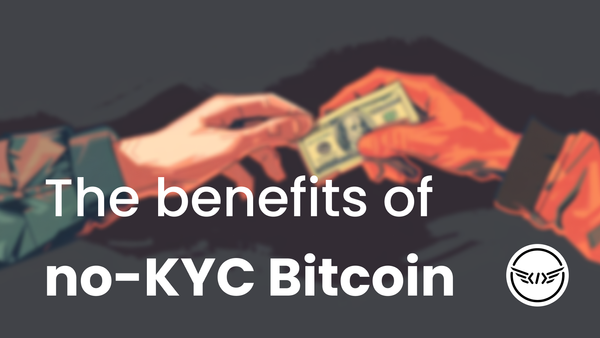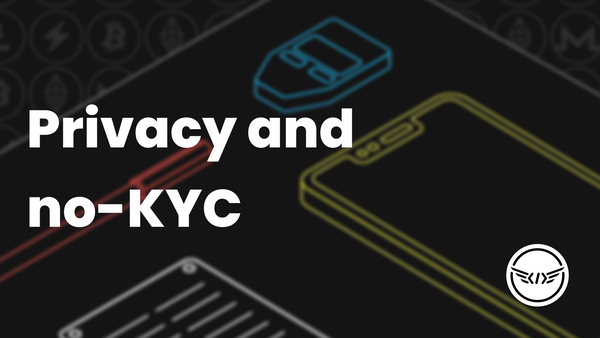If you take away the state’s monopoly over the means of economic interaction, then you take away one of the three principal ingredients of the state. In the model of the state as a mafia, where the state is a protection racket, the state shakes people down for money in every possible way. Controlling currency flows is important for revenue-raising by the state, but it is also important for simply controlling what people do... - Julian Assange
Since time immemorial governments have been unable to resist the urge to control and dominate the monetary system. Controlling the money supply is a power so great that it bestows upon its possessor the ability to command control over human time; and it’s this lust for power that gave birth to central banking. From coin-clipping to central bank digital currencies (CBDC’s), monetary history is filled with numerous attempts by the state and/or banking cartels to be “masters of the universe”. In our modern society, this quest for unrestrained power by the state birthed legal tender laws that further entrenched the power and influence of the central banking leviathan; giving the state a monopoly over the issuance of money in a specific territory.
By establishing a monopolistic control over the issuance and distribution of money, as well as through the imposition of a given currency, legal tender laws not only disrupt the principles of a free market but also curtail consumer autonomy. These regulations are founded on the mistaken premise that money is a construct of the state thus placing the government at the heart of every transaction; as the final enforcer of all contractual agreements. If history is any guide, this position has been subject to abuse over and over again. Intriguingly, it's from the very heart of these legal tender laws that intrusion into financial privacy becomes normalized and codified into law.
The Rise of Financial Surveillance
Surveillance by the state and its corporate partners has become increasingly common and accepted in recent years. This is due to a number of factors, including the rise of new technologies that make surveillance easier (e.g. nano-tech and AI) and more efficient, as well as the perceived need to protect against terrorism and other threats; which gave rise to draconian legislations like the Patriot Act. However, this level of surveillance violates individual privacy and freedom; as one cannot be truly free without the right to privacy being protected. The unfortunate reality is that for the most part, existing laws and political processes are a major part of the problem in the fight to protect your privacy in a world where everything is tracked. It’s against this background that we will explore in depth some of the threats to privacy in our modern era, even more so where Bitcoin usage is concerned.
Privacy is necessary for an open society in the electronic age. Privacy is not secrecy. A private matter is something one doesn’t want the whole world to know, but a secret matter is something one doesn’t want anybody to know. Privacy is the power to selectively reveal oneself to the world…Therefore, privacy in an open society requires anonymous transaction systems. Until now, cash has been the primary such system. An anonymous transaction system is not a secret transaction system. An anonymous system empowers individuals to reveal their identity when desired and only when desired; this is the essence of privacy. - Eric Hughes
The words of Eric Hughes in the quote above are just as true today as they were 30 years ago when they were written. Privacy is no longer a luxury but a necessity, especially in this age where we are constantly surrounded by more and more surveillance tools. In his keynote address at the recently concluded Bitcoin Amsterdam conference, NSA whistleblower Edward Snowden noted that, “Bitcoin has a privacy problem… the world has a privacy problem.” He went on to explain that while the development of coinjoins and mixers is a positive step, it is not a perfect solution to Bitcoin's privacy problem. A very valid but controversial criticism in my view.
Instead of relying solely on techniques like coinjoins and mixers, he encouraged the development of tools that do not require users to "contort themselves" to maintain privacy, while prioritizing the creation of privacy-first solutions. These solutions should not require users to jump through hoops to maintain their privacy but should be user-friendly and intuitive. While this is easier said than done, it’s the only way that will ensure that Bitcoiners will still be able to use Bitcoin freely without being burdened by onerous regulations. More importantly the enemies of Bitcoin are working hard, every single day, in an effort to destroy financial privacy and brand anyone who values and preserves their financial privacy as a potential cybercriminal.
Increasingly Anti-Privacy Regulation
For example, the bill H.R.2969, titled the "Financial Technology Protection Act of 2023," proposes the establishment of an Independent Financial Technology Working Group. This group is tasked with addressing the concerns of terrorism and illicit financing associated with new financial technologies. The working group includes representatives from various government agencies and sectors, such as the Treasury, the Department of Justice, the Department of Homeland Security, Financial Crimes Enforcement Network (FinCEN), the Central Intelligence Agency, and a select group of private financial technology and blockchain companies.
The potential dangers posed by this bill to financial privacy revolve around the broad-reaching powers of the working group. To begin with, the working group is composed of organizations that have previously been hostile, not only to Bitcoin, but to financial privacy in general. Furthermore, the bill's mandate to develop legislative and regulatory proposals to enhance anti-money laundering and counter-terrorist efforts may result in regulations that erode financial privacy. The broad representation of financial institutions, intelligence agencies, and government entities within the working group raises concerns about potential conflicts of interest and the prioritization of security over individual privacy rights. This bill highlights the ongoing efforts to outlaw financial privacy across the board.
Another recent example of this slow creep to outlawing financial privacy is the recent FinCEN rule proposal, which has rightly drawn significant criticism for its overly broad scope and potential implications for individual financial privacy. Underpinned by the Bank Secrecy Act and section 311 of the Patriot Act, it aims to mandate the reporting of various transactions involving cryptocurrency mixing, encompassing a wide array of activities that could be considered routine or benign. The proposal's definitions of mixing are expansive, covering actions such as pooling funds, using certain software, splitting and transmitting funds, creating single-use wallets, and exchanging different types of cryptocurrencies!
It’s also interesting to note that this is happening against the background of a Bitcoin price pump, which was sparked by the news of the approval of a spot Bitcoin ETF in the US. While many view this as a positive, I am of the opinion that if a spot ETF does get approved, it’s not a coincidence that these two events are happening concurrently. It’s likely that the retail investors are eventually going to be excluded from owning Bitcoin except via an ETF due to some of these onerous reporting requirements that are being put forward by this FinCEN rule. It goes without saying that there is no privacy to be had or enjoyed by owning an ETF to say nothing of the counter-party risk, as well as being once again fenced in a fiat environment through Wall St controlled financial instruments. I digress.
Another major concern with the FinCEN proposal is the extensive amount of private information that regulated businesses would be required to report to the government for each transaction, including details about the user's identity, transaction history, and associated addresses. Notably, there is no exemption for private individuals seeking to maintain the privacy of their financial activities, further raising concerns about potential breaches of privacy. Furthermore, the proposal's arguments in favor of the rule primarily focus on examples of stopping “illicit activities,” while downplaying the lack of data on legitimate uses of mixing. Funny how that works right? Anyway, this approach fails to consider the broader context and potential implications for individual financial privacy.
This not only puts individuals living in repressive countries at great risk; but despite the extreme surveillance of the current financial system thanks to anti-money laundering laws (AML), the impact on criminal finances has been less than 0.1%. Meanwhile, compliance costs far exceed recovered criminal funds by more than a hundred times and the public are penalized more than criminal enterprises by increased costs and privacy risks. Given this track record, it’s glaringly clear that the purpose of these laws is to “legally” create a dragnet surveillance apparatus that has the side effects of introducing a lot of unnecessary red tape around transactions and making the financial system more inefficient.
A Silver Lining?
While on the one hand it’s difficult to foresee how enforceable all of this would be in practice, the greater danger lies in the fact that when such vague and dangerous regulations are adopted they become even more difficult to repeal. Perhaps a silver lining in all of this is that the potential roll out of these regulations is proof positive that blockchain tracing methods of companies like Chainalysis are ineffective and inaccurate, hence why stronger measures are now being deployed.
Chainalysis’ tracing methods are currently being challenged in court in the case of Roman Sterlingov, a Russian national that is currently under arrest in the US on allegations of operating the Bitcoin mixer Bitcoin Fog which is believed to have been used to launder over $336 million. Sterlingov maintains that although he used Bitcoin Fog in the past to protect his identity from bad actors, he isn’t Bitcoin Fog’s creator. Aside from Chainalysis’ software pointing in his direction, no solid corroborating evidence has been found linking Roman to the creation of Bitcoin Fog.
It is even more perplexing when you consider that Elizabeth Bisbee, the head of Chainalysis' Investigative Solutions division, admitted in court during the ongoing Sterlingov case that she was unaware of any scientific evidence to support the accuracy of Chainalysis' Reactor software. In addition, a statement issued by Chainalysis also reveals that Bisbee is not only unaware of margins of error rates for Chainalysis’ software, but that Chainalysis hasn’t been keeping track of the false positive and negative rates for its software at all!
Conviction of Sterlingov under these circumstances would not only be a miscarriage of justice due to the insufficient evidence thus far, but would set a terrible precedent and make anyone seeking to protect their financial privacy a target for malicious prosecution based on “roll of the dice” type evidence. What’s really on trial here is whether or not you really do have the right to privacy.
We know that no one ever seizes power with the intention of relinquishing it. - 1984, George Orwell
Conclusion
Snowden, in his Amsterdam address, further warned attendees of the digital panopticon that was being built around them, and cautioned them against focusing exclusively on Bitcoin’s price when their freedoms are slowly being eroded. A warning that I hope will be heeded because the powers that be aren’t just stopping with prosecuting the Sterlingovs of this world, but are taking things a step further to include public-private partnerships with organizations like the World Economic Forum for combating “cybercrime,” something that will likely brand Bitcoiners as “cybercriminals.” This PPP (also known as WEF-PAC) includes everyone from Amazon, Chainalysis, the FBI, Interpol, the European Commission and Microsoft. Given the WEF’s “high regard” for Bitcoin and freedom in general, I expect nothing but “good outcomes” for the Bitcoin space from the WEF-PAC.
The time to build more privacy-first technologies and applications is now. Leveraging decentralized protocols like Nostr for social media as well as for building marketplaces and other services would be a step in the right direction. Easy to use, privacy-first solutions would not only lead to more mass adoption of these tools, but would also render any attempts to set up more financial surveillance systems by the state and its corporate partners fruitless. While this article only showed a few examples of the threats to your financial privacy and overall freedom as a human being, you can bet that many more are in the works, with CBDCs playing a large role. Without privacy there can be no freedom, as the erosion of one compromises the other.
Join the Conversation
If this post has sparked an idea or motivated you to get involved, there is no better next step then to join the conversation here at freedom.tech! Subscribers can jump straight into the comments below, or you can join our community SimpleX group:

If you have feedback for this post, have something you'd like to write about on freedom.tech, or simply want to get in touch, you can find all of our contact info here:











